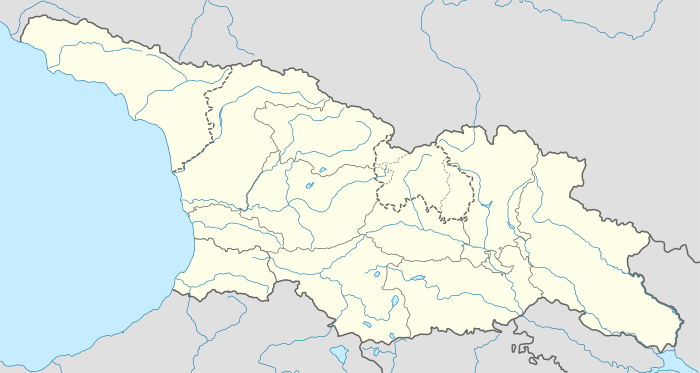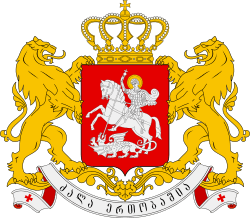Ambrolauri
| Ambrolauri ამბროლაური | |||
|---|---|---|---|
|
View of Ambrolauri in 2011 | |||
| |||
 Ambrolauri Location of Ambrolauri in Georgia | |||
| Coordinates: 42°31′18″N 43°08′54″E / 42.52167°N 43.14833°E | |||
| Country |
| ||
| Mkhare | Racha-Lechkhumi and Kvemo Svaneti | ||
| Area | |||
| • Total | 1.6 km2 (0.6 sq mi) | ||
| Elevation | 550 m (1,800 ft) | ||
| Population (2002) | |||
| • Total | 2,047 | ||
| Time zone | Georgian Time (UTC+4) | ||
| Post code | 0400 | ||
| Area code(s) | +995 439 | ||
| Website | Ambrolauri City Hall | ||
Ambrolauri (Georgian: ამბროლაური) is a city in Georgia, located in the western part of the country, on both banks of the Rioni river, at the elevation of 550 m above sea level. It is a self-governing city.[1] At the same time, the city serves as the seat of the Racha-Lechkhumi and Kvemo Svaneti regional administration and of the Ambrolauri Municipality. According to the 2014 census, the city had a population of 2,047. Its area is 1.6 km2.[2]
Ambrolauri is first recorded in the 17th century as a place, where one of the palaces of the kings of Imereti was located. It acquired the city status in 1966 and became a self-governing city with its own municipal government in 2014.
The georgian gouvernment announced the construction of an regional airport to serve Ambrolauri and the region.
History
The territory of Ambrolauri has not been systematically studied archaeologically. The toponym Ambrolauri is known from the 17th century. The Russian diplomat Alexey Yevlev, who visited the Kingdom of Imereti in 1650, and then the Georgian scholar Prince Vakhushti, writing c. 1745, mention a royal castle at Ambrolauri, where the Krikhula River becomes a tributary of the Rioni. Only insignificant ruins of that palace have survived. The name of the city may have been derived from the surname Amarolisdze, while the settlement could have earlier been known as Metekhara, a toponym recorded in the 11th-century charter to the Nikortsminda Cathedral.[3]
In 1769, the Imeretian king Solomon I granted Ambrolauri to a prince from the Machabeli family, Zurab, an in-law of the Tsulukidze, one of the leading families in Racha. An old three-storey tower built of stone and lime, located in the city, is still known to the locals as the Machabeli Tower. Ruins of a stone hall church are also found nearby. An inscription from the church doorway makes mention of King George III of Imereti (r. 1605–1639) and his family. A hoard of hundreds of coins buried early in the 17th century, including those with Arabic inscription stuck at Tbilisi and those issued in the name of George II of Imereti (r. 1565–1585), was unearthed in 1909.[3]
After the Russian conquest of Imereti in 1810, Ambrolauri became a part of the Racha district (uyezd). In Soviet Georgia, it became the seat of the Ambrolauri district (raion) in 1930 and acquired the city status in 1966. In 1934, Ambrolauri was renamed into Enukidze after the Soviet statesman Avel Yenukidze, on whose execution in 1937, the city's old name was restored.[4] In 1968, Ambrolauri had a population of 4,400.[5]
The city was damaged in the 1991 Racha earthquake. It, further, experienced a decline in population and economic activity in the years of post-Soviet crisis. Ambrolauri became the seat of Racha-Lechkhumi and Kvemo Svaneti regional administration in 1995. As a result of the local government reform in 2014, Ambrolauri was split from the homonymous municipality as a self-governing city and the city's population directly elected its first ever mayor.[6]
Government
Ambrolauri is a self-governing city with its own municipal governance—a representative council (sakrebulo) and an executive body headed by a mayor. Like in Georgia's other self-governing territorial subdivisions, the city's population directly elects both the council and mayor for a four-year term.[7] Ambrolauri is the seat of the State Commissioner (or governor), representing Georgia's central government in the city of Ambrolauri and four other municipalities grouped together into the Racha-Lechkhumi and Kvemo Svaneti region. Ambrolauri also houses the bodies of local self-government of the Ambrolauri Municipality, which is a separate self-governing community.[8]
| Name | Party | Years |
|---|---|---|
| Rati Namgaladze, b. 1965 | Georgian Dream | 2014 – |
Culture
Ambrolauri is home to the Museum of Fine Arts,[9] and a theatre. The environs of Ambrolauri are rich in historical monuments such as the churches of Barakoni and Nikortsminda. A recreational zone is being developed at Shaori Lake, south of Ambrolauri.[10]
References
- ↑ "ქალაქ ამბროლაურის მუნიციპალიტეტი [Municipality of the City of Ambrolauri]". მუნიციპალიტეტების რეესტრი [Registry of Municipalities] (in Georgian). National Agency of Civil Registry. Retrieved 9 July 2015.
- ↑ "თვითმმართველი ქალაქები [Self-governing cities]". National Association of Local Self-Governments of Georgia. Retrieved 9 July 2015.
- 1 2 Gamkrelidze, Gela; et al., eds. (2013). "ამბროლაური (Ambrolauri)". ქართლის ცხოვრების ტოპოარქეოლოგიური ლექსიკონი [A Topoarchaeological dictionary of Kartlis tskhovreba (The history of Georgia)] (PDF) (in Georgian) (1st ed.). Tbilisi: Center of Archaeology, National Museum of Georgia. p. 30. ISBN 978-9941-15-896-4.
- ↑ Pospelov, Yevgeny (1993). Имена городов: вчера и сегодня (1917–1992). Топонимический словарь [City Names: Yesterday and Today (1917–1992). Toponymic Dictionary] (in Russian). Moscow: Russkiye slovari. p. 27.
- ↑ "Амбролаури [Ambrolauri]". Большая советская энциклопедия [Great Soviet Encyclopaedia] (in Russian) (3rd ed.). Moscow: Sovetskaya entsiklopediya. 1978.
- ↑ "Final Results of the Election Day according to ISFED Data". International Society for Fair Elections and Democracy. 16 June 2014. Retrieved 9 July 2015.
- ↑ ადგილობრივი თვითმმართველობის კოდექსი [Code of Local Self-Government], Organic law No. 1958-IIს of 5 February 2014 (in Georgian). Retrieved on 9 July 2015.
- ↑ Article 2, საქართველოს პარლამენტის დადგენილება მუნიციპალიტეტების გაყოფისა და თვითმმართველი თემების − მუნიციპალიტეტების შექმნის შესახებ [On division of municipalities and creation of self-governing communities], Resolution of the Parliament of Georgia No. N2205-IIს of 4 April 2014 (in Georgian). Retrieved on 9 July 2015.
- ↑ "Ambrolauri Fine Art Museum". Georgian Museums. Ministry of Culture and Monuments Protection of Georgia, ICOM National Committee in Georgia, Georgian Museums Association, Culturological Research Association. Retrieved 9 July 2015.
- ↑ "Moscow-based Georgian Businessman to Build a Hotel on the Shaori Lake". Caucasus Business Week. 14 April 2015. Retrieved 9 July 2015.
External links
 Media related to Ambrolauri at Wikimedia Commons
Media related to Ambrolauri at Wikimedia Commons
.jpg)
.svg.png)


